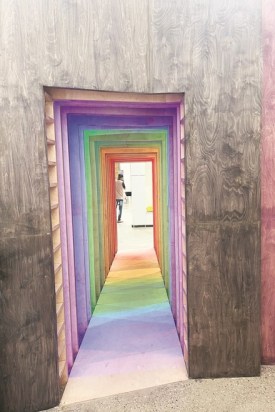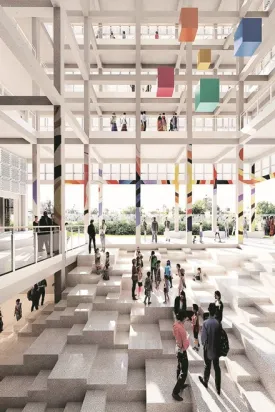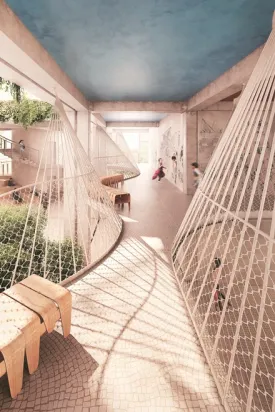In the foothills of the Aravalli mountain ranges, a sprawling new space is aiming to do something spectacular. Christened Third Space, the new science and arts centre at Chitrakoot Nagar, a city extension of Udaipur, borrows its philosophy from American sociologist Ray Oldenburg, who put public spaces at the centre of social progress and harmony. Oldenburg’s theory was called ‘third place’, a term that applies to parks, pubs and even post offices, compared to home as the first place and office as the second. With a slightly tweaked name, Third Space in the City of Lakes may have been the idea people were looking for to reignite the conversation about the importance of public spaces.
“Ray Oldenburg said any thriving democracy has many third places for people,” says Shivani Singhal, the founder of Third Space. “Communities disintegrate when third spaces fall apart,” adds Singhal. Opened to the public on July 29, Third Space sits on a 14,000-square-metre floor area within an aesthetically designed and environment-friendly home for the curious and the quizzical. It has two large exhibition spaces for science and art shows and a library whose shelves are stacked with books on scientists, inventors, sports and cultural icons. The science and art exhibitions focus on how technology will shape society, why it is worth going to space and sustainability of life.

Celebrating curiosity
Visitors enter a five-storey building housing a science lab, meeting spot, Jugaad lab, an exhibition hall named Frontiers, a tower, climbing wall, cafe, adventure adda, a backstage, theatre, library and a toddler space. In the basement is a water body that cools the entire building. Each space is designed to allow learning and questioning the purpose and direction of knowledge, letting minds to create their own vision. The Jugaad lab has 3-D pens to create objects and in the sculpture lab visitors can design and print their own badges, for a start. Frontiers, a large exhibition hall, invites visitors to explore the rapid changes in science and technology and provokes them to question the way the changes will influence communities. There is a game machine where a visitor can proofread an artificial intelligence (AI) content and another to check if a social media post is fake news.
Third Space has been built on the belief that learning leads to inventing. “Not only scientists and inventors, but poets, philosophers and wonderful parents too,” says Singhal about the potential of the new project to create the country’s next generation of thinkers, scientists and inventors. “We want this space to push the sense of who we are through autonomy and freedom of mind,” says the Udaipur-born Singhal, who began pursuing the Third Space project a decade ago. “There is a huge hunger for learning. But we need to create a space for the community to do so,” explains Singhal, who worked in Mumbai schools for her Teach for India fellowship after studying at Oxford University. “Our core belief is that anyone can learn anything,” she adds.

Exhibition spaces are also structured to understand cultures and communities. A machine allows a visitor to choose a grain by spinning a wheel of grains to learn about food as well as genetically modified seeds. Questions are raised too, one about what happens if a crop we heavily rely on gets hit by a disease, like the Gros Michel banana of Central America that was wiped by the Panama disease in the 1960s. Another machine allows the visitor to choose a textile variety from the scores stocked inside and learn about the links between traditional weaving communities.
Creating inventors
Part of Udaipur-based not-for-profit social organisation, Dharohar, which aims to aid individuals to step up and take charge to face challenges like climate change, poverty and educational inequity, Third Space has been inspired by many science and art museums around the world in its decade-long journey from project to development. Initially, Dharohar ran Khoj, an initiative for scientific experiments by school children in Udaipur. When Dharohar redeveloped and repurposed public parks and gardens in Udaipur people began to use the public space. It even ran a Third Space prototype for a decade inside a city mall. “Small interventions make all the difference,” says Ananya Singhal, an Udaipur-based architect who designed Third Space.

One of the first workshops at Third Space is by sculptor Nitin Barchha, the co-founder of Material Immaterial Studio, which celebrates minimalist design with the beauty of bare materials. Among the workshop participants are eight students, some of them architects, from Udaipur. “We will have regular author sessions, film festivals and workshops,” says Rohit Jani, the head of partnerships at Third Space. The water body in the basement of Third Space is free to the public while entry into the main areas would need a daily ticket or a membership. Some of the areas of Third Space, like a cinema, are in various stages of development. “We expect Third Space to be completed by the end of this year,” says Singhal.
Lab for learners
Exploratorium, San Francisco, US: Founded by Frank Oppenheimer, the physicist-brother of J R Oppenheimer, the Father of Atom Bomb, the Exploratorium calls itself an R&D laboratory that experiments with cutting-edge ideas. Oppenheimer created the Exploratorium in 1969 using a Library of Experiments he developed at his university for students to follow their own curiosity. He believed that visitors could learn about natural phenomena and also gain confidence in their ability to understand the world around them.
Winchester Science Centre, UK: Part of an independent education charity, Winchester Science Centre and Planetarium in southern England is a home for children and families to get on a roller-coaster ride of learning and discovery about science, engineering, technology and mathematics through exhibitions and adventure and fun trips. Launched in 2002, the centre located in the city of Hampshire encourages visitors to understand our planet and protect it. The education charity, which recently renamed itself Wonderseekers, has a vision for a world where, through the wonder of science, people and the planet thrive.
Tropenmuseum, Amsterdam, The Netherlands: A museum of world cultures, Tropenmuseum in Amsterdam draws visitors to the vast diversity of the world through human stories. Opened in 2014, the museum’s exhibitions in the past include an interactive monument with names of enslaved people. Among the current ones are a show investigating the relationship between colonialism and the financial system and another on how colonialism shaped the world of today.









